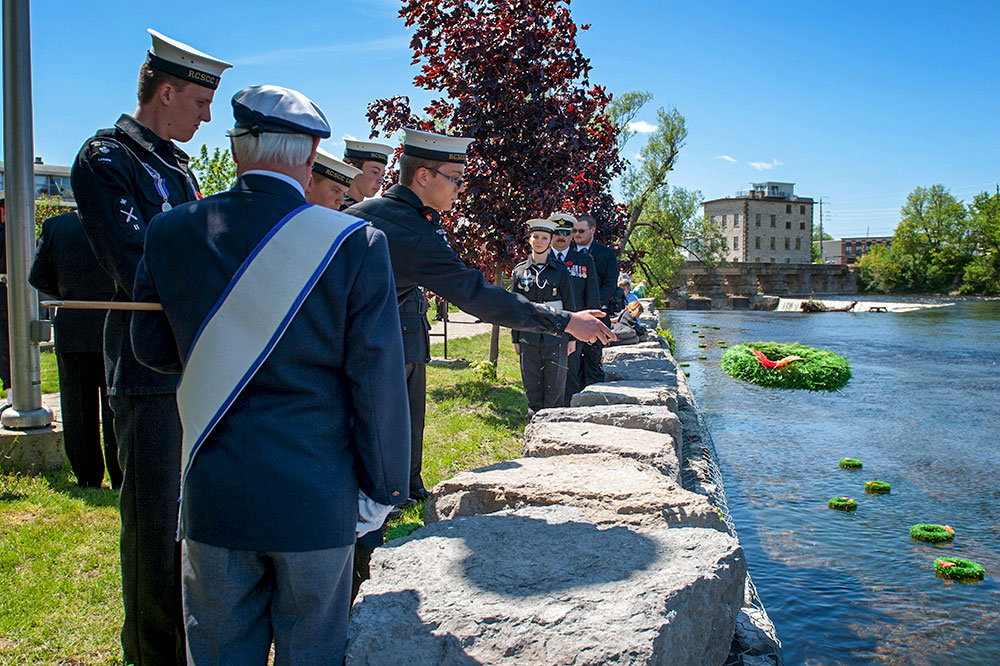
This year marks the 73rd Anniversary of the turning of the tide in the Battle of the Atlantic. Although it would continue until May of 1945, a combination of training, air cover, better equipment and improved intelligence gave the Allies the upper hand in 1943.
Lasting 2,075 days, the Battle of the Atlantic was the longest and, arguably, the most important campaign of WWII. Without open sea lanes between North America and Britain, the Allied victory over Germany would not have been possible. It was won because of the courage, determination and sacrifice of the men of the merchant marine and the Allied navies at sea, and the many others, both men and women, who supported them on land and in the air.
Canada’s navy began the war with 6 destroyers, 5 minesweepers and 2 auxiliary vessels. Its total strength was 3,252 officers and men. At war’s end, the Royal Canadian navy had 373 fighting ships and over 110,000 members, all of whom were volunteers, including 6,500 women who served in the Women’s Royal Canadian Naval Services.
Many of the sailors were in their teens – boys from the mid-west who had never seen the ocean before they enlisted. Many had no sailing experience, yet they persevered. What was it like, this thing called the Battle of the Atlantic? Naval veteran, J.C. Dixon described it vividly when he wrote
“It was like the monotonous route of a bus perhaps; hauling back and forth from the grey sea of Newfoundland to the Irish coast with the waste of the Atlantic between.
It was a greasy sea littered with pieces of plank, cabbage crates, parts of lifeboats and humped blobs black with bunker oil, a husband or son – or somebody’s brother.
And it was starlit nights when the sea rested and no one slept – waiting. It was the bitter waiting for something to happen and dreading the moment when it would.”
In the early days of the war, the German U-boats had the advantage. Capable of staying at sea for three months, they carried up to 21 torpedoes and also laid mines. In June, 1941, alone, over 500,000 tons of allied shipping was lost to U-boats. The task of convoy escort fell to Canada’s “corvette navy”. Frank Curry of the Royal Canadian Navy kept a diary aboard a corvette on convoy duty in 1941. In it he noted “What a miserable rotten hopeless life… an Atlantic so rough it seems impossible that we can continue to take this unending pounding and still remain in one piece… hanging onto a convoy is a full-time job… the crew in almost a stupor from the nightmarishness of it all… and still we go on hour after hour.”
For the crews of vessels crippled or sunk by U-boats, there was little hope. Convoys seldom stopped to pick up survivors lest they be attacked also. It was a cold, dirty way to die, covered in oil, clinging to anything that floated and watching shipmates succumb to hypothermia, knowing that your turn wasn’t far away.
Members of the public are invited to join the Royal Canadian Legion Branch 240 Almonte on Sunday, May 29 at 2:00pm for a service of Remembrance beside the old Town Hall in Almonte to honour those who made the supreme sacrifice at sea in WWII. Bells will toll for each warship lost and it will be a time to reflect on the courage and perseverance of those who served on the cold, grey and always dangerous waters of the Atlantic Ocean.
The parade leaves Branch 240 at 1:30pm with a colour party and a contingent of local Sea Cadets. The Reviewing Officer is Vice Admiral (Ret) Ron Buck. Come on out and help give meaning to the words “They grow not old, as we that are left grow old. Age shall not weary them, nor the years condemn. At the going down of the sun and in the morning – we will remember them.”
“Your local Legion – keeping the memories alive.”

